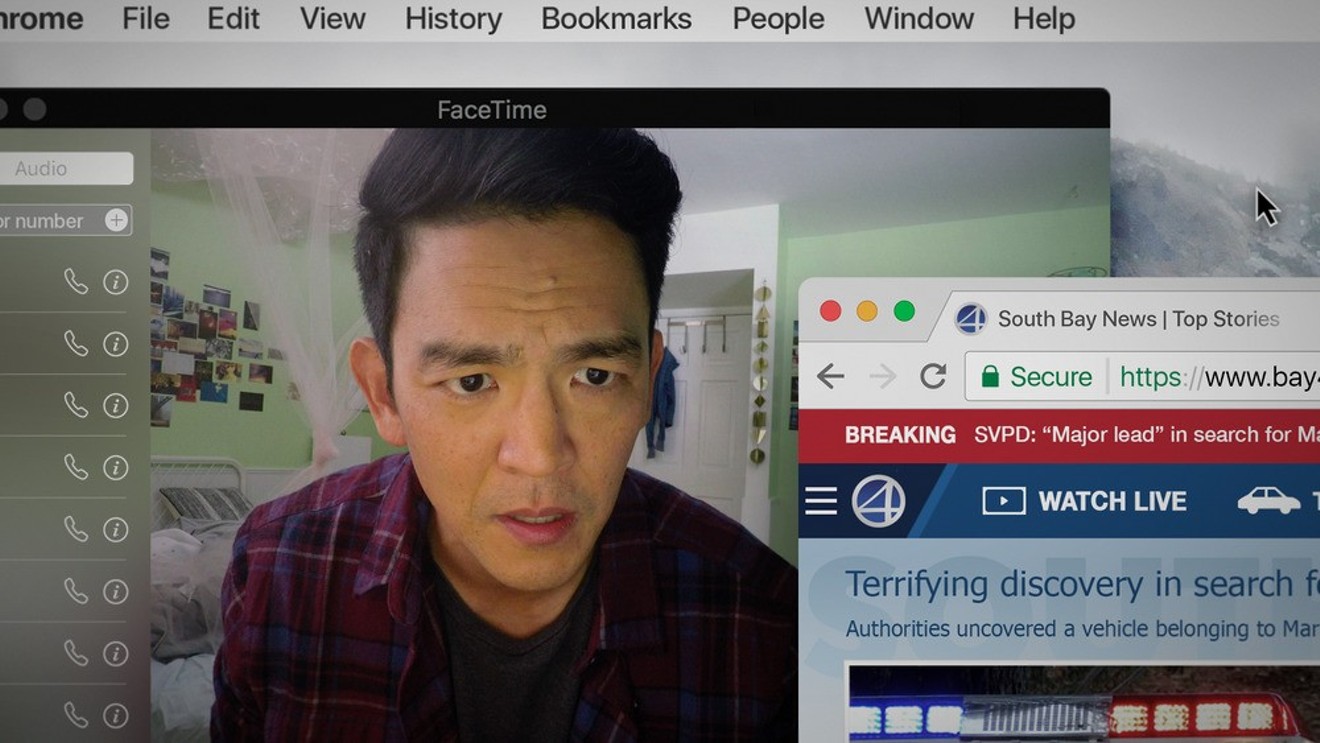Director Timur Bekmambetov has said that he developed the screen-capture technology responsible for the transtextual horror film Unfriended: Dark Web and the thriller Profile when he realized Americans spend up to half their waking hours online or connected to devices. Now he has produced a feature directed by Aneesh Chaganty called Searching, starring John Cho as a checked-out father combing through his missing daughter’s online footprint, hunting for any clues that might help reveal what has happened to her. The story shares hallmarks with some of the best twisty, turny whodunits, and that at least kept my interest, but as the action played out via FaceTime and YouTube videos, I couldn’t help but wonder: What’s actually gained by this novel technique of watching a story on a screen on a screen? And every time I wondered this, I imagined how whatever scene I was watching might have been staged and shot and acted out in a more traditional film — and I was inevitably disappointed by what has been lost, especially in terms of cinematic decision-making and flesh-and-blood performances.
We meet husband David Kim (Cho) and wife Pam (Sara Sohn) through a long, 10- or 15-minute montage of videos, emails and texts presented in a manner reminiscent of those Apple ads that try desperately to convince you it’s a joyful thing to commit your entire life to their tech. Chaganty is essentially trying to sell his audience something similar — please buy his tech-based story! He’s savoring rather than critiquing. Even the music seems ripped off from twee commercials. We see David and Pam go on vacations and cheer on the accomplishments of their daughter Margot (played by a succession of actors as Margot grows older, including Alex Jayne Go, Megan Liu, Kya Dawn Lau and finally Michelle La). An email with the subject line “Test Results” pops up, and then Pam’s struggle with cancer is portrayed through a Google search for “How to fight cancer as a family?” I admit that I’ll cry at most tearjerker commercials, and this montage is a potent example of the form, so it’s not surprising that my eyes wetted when we learn that Pam has taken a turn for the worse — a revelation followed by an image of Margot’s first day at school with just her father.
The next time we see David, he’s FaceTiming with his teen daughter, telling her to come home right after her study session — and to take out the trash. He’s stilted, tense. In the middle of the night, David misses three calls from Margot, and then everything goes awry. Now no one knows where Margot has gone, and after digging into her computer, David finds out he may not know his daughter at all. It’s an apt story for today. Think of how many news articles have popped up about parents who didn’t realize their kids had been indoctrinated into Nazism via YouTube.
So, the film has promise, but the tech keeps getting in the way of the performances. Debra Messing, who plays Detective Vick, is a formidable actress, and yet I didn’t believe a word she said, especially when she was just a detached voice on the phone — too clean and too crisp. Why wouldn’t you want to see John Cho and Debra Messing actually vibing off each other in a scene? Chemistry between actors has only fueled Hollywood filmmaking for a century! But the bigger question is why a filmmaker would be so committed to putting what we watch on the small screen on the big screen. What’s the point, when even YouTube is creating content (like Cobra Kai) that is designed to make you forget you’re watching YouTube?
See, there’s a thing called “co-presence” — that feeling of being there with the people you see on the screen — that most filmmakers strive to achieve for their audience, even if they don’t know that’s what they’re doing. Tech has been trying to make big strides towards co-presence with 3D and motion capture, though scientists have found that attempting to ape reality’s dimensions on screen doesn’t actually trick the human brain. It might look cool, for sure. But we don’t buy it as real. The only thing that does create a feeling of co-presence? Big-screen technology like IMAX or your local Cinerama Dome, with traditional filmic cinematography. It’s one of the reasons film lovers are so averse to watching movies with the smooth motion setting on their TV.
In the least effective parts of Searching, David must leave his FaceTime camera on his laptop open, even after calls have ended, so that we can see Cho’s performance. I was yanked out of Searching’s reality every time this happened. Bekmambetov’s purpose for telling stories on screen is to mirror our reality, but the choices the characters make to keep the drama unfolding before our eyes are at cross-purposes with the producer’s intent. Though the script by Chaganty and Sev Ohanian is taut and surprising, I’ve felt more absorbed in an episode of Murder, She Wrote than I did in this film, because, there, it’s story and performance that we’re invited to savor, not just tech and technique.
[
{
"name": "GPT - Billboard - Slot Inline - Content - Labeled - No Desktop",
"component": "16971022",
"insertPoint": "2",
"requiredCountToDisplay": "2"
},{
"name": "Editor Picks",
"component": "15769925",
"insertPoint": "4",
"requiredCountToDisplay": "1"
},{
"name": "Inline Links",
"component": "16575154",
"insertPoint": "8th",
"startingPoint": 8,
"requiredCountToDisplay": "7",
"maxInsertions": 25
},{
"name": "GPT - Rectangle 2x - Slot Auto-select - Labeled",
"component": "15782206",
"insertPoint": "8th",
"startingPoint": 8,
"requiredCountToDisplay": "7",
"maxInsertions": 25
},{
"name": "Inline Links",
"component": "16575154",
"insertPoint": "8th",
"startingPoint": 12,
"requiredCountToDisplay": "11",
"maxInsertions": 25
},{
"name": "GPT - Leaderboard to Tower - Slot Auto-select - Labeled",
"component": "15782207",
"insertPoint": "8th",
"startingPoint": 12,
"requiredCountToDisplay": "11",
"maxInsertions": 25
}
]











